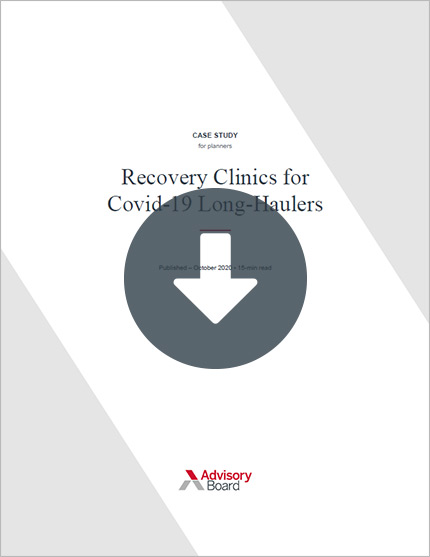Auto logout in seconds.
Continue LogoutAn estimated 10% to 30% of Covid-19 patients develop long Covid, where symptoms last for months past an initial coronavirus infection—but recent research suggests that Covid-19 vaccines may help prevent and alleviate these long-term symptoms.
Recovery clinics for Covid-19 long-haulers
Early research on long Covid prevention
Some early research has found Covid-19 vaccines help prevent and alleviate long Covid symptoms. One study published The Lancet in September found that fully vaccinated people were 49% less likely to experience long Covid symptoms than those who were unvaccinated.
"This is really, I think, the first study showing that long Covid is reduced by double vaccination, and it's reduced significantly," said Claire Steves, a geriatrician and clinical academic at King's College in London, who was the lead author on the study.
And those who were vaccinated and did develop long Covid experienced symptoms less frequently than unvaccinated people with the condition, the study found.
"We don't have a treatment yet for long Covid," Steves said. But getting vaccinated "is a prevention strategy that everybody can engage in," she said
Another small, preliminary study from the United Kingdom found that 44 vaccinated patients' long Covid symptoms improved slightly compared with 22 unvaccinated long Covid patients.
Does post-infection vaccination reduce long Covid symptoms?
But one of the largest studies on whether Covid-19 vaccines can alleviate symptoms after people have already developed long Covid was published recently on The Lancet's preprint server.
The French study looked at 455 vaccinated and 455 unvaccinated long Covid patients and found the rate of remission among the vaccinated patients was 16.6% four months after vaccination, compared with 7.5% among the unvaccinated patients.
Vaccinated patients also reported an average of 13 symptoms four months after vaccination compared with 15 symptoms before, and vaccinated patients reported their long Covid had less of an impact on their lives than the unvaccinated patients.
Viet-Thi Tran, an associate professor of epidemiology at Université de Paris and lead author on the study, said he believes Covid-19 vaccines may eliminate a reservoir of virus in the body that could be causing long Covid. However, Tran added it's possible the placebo effect could be a factor, as patients may feel better after getting vaccinated because they expect to.
Akiko Iwasaki, a professor of immunobiology at Yale University, said the study's findings are consistent with the hypothesis that Covid-19 vaccines may eliminate leftover virus in the body that could be causing symptoms.
The findings also suggest long Covid could be caused by a reaction of the autoimmune system, Iwasaki said, which means vaccination may temporarily stop the secretion of toxic cytokines, which can alleviate symptoms.
David Putrino, director of rehabilitation innovation at Mount Sinai Health System, said he has over 400 long Covid patients in a rehab program, and around half have reported their condition has improved after vaccination, while the other half feel either the same or worse.
Putrino said he thinks the French study's findings that "the vaccine is modulating symptoms" is "compelling," but added he thinks it's important to figure out why some patients feel better while others don't.
Daniel Griffin, chief of the division of infectious diseases for ProHealth NY, said about 60% of the long Covid patients in the network have reported their conditions improved after getting vaccinated.
"What we're seeing usually is improvement but not complete recovery," Griffin said. "So now I can smell again. Now I can go up that flight of stairs again. I can go back to work but I still need to lay down when I get home." (Reddy, Wall Street Journal, 10/11; Scully, The Hill, 9/2)
Download the case study

Several health systems have set up dedicated recovery clinics to help treat and coordinate care for long-haulers. This resource provides an overview of Covid-19 recovery clinic models pioneered by two early adopters—The University of Iowa Hospitals and Clinics and the University of Pennsylvania Medicine—and considerations for assessing whether it is a model you should pursue.
Don't miss out on the latest Advisory Board insights
Create your free account to access 1 resource, including the latest research and webinars.
Want access without creating an account?
You have 1 free members-only resource remaining this month.
1 free members-only resources remaining
1 free members-only resources remaining
You've reached your limit of free insights
Become a member to access all of Advisory Board's resources, events, and experts
Never miss out on the latest innovative health care content tailored to you.
Benefits include:
You've reached your limit of free insights
Become a member to access all of Advisory Board's resources, events, and experts
Never miss out on the latest innovative health care content tailored to you.
Benefits include:
This content is available through your Curated Research partnership with Advisory Board. Click on ‘view this resource’ to read the full piece
Email ask@advisory.com to learn more
Click on ‘Become a Member’ to learn about the benefits of a Full-Access partnership with Advisory Board
Never miss out on the latest innovative health care content tailored to you.
Benefits Include:
This is for members only. Learn more.
Click on ‘Become a Member’ to learn about the benefits of a Full-Access partnership with Advisory Board
Never miss out on the latest innovative health care content tailored to you.
